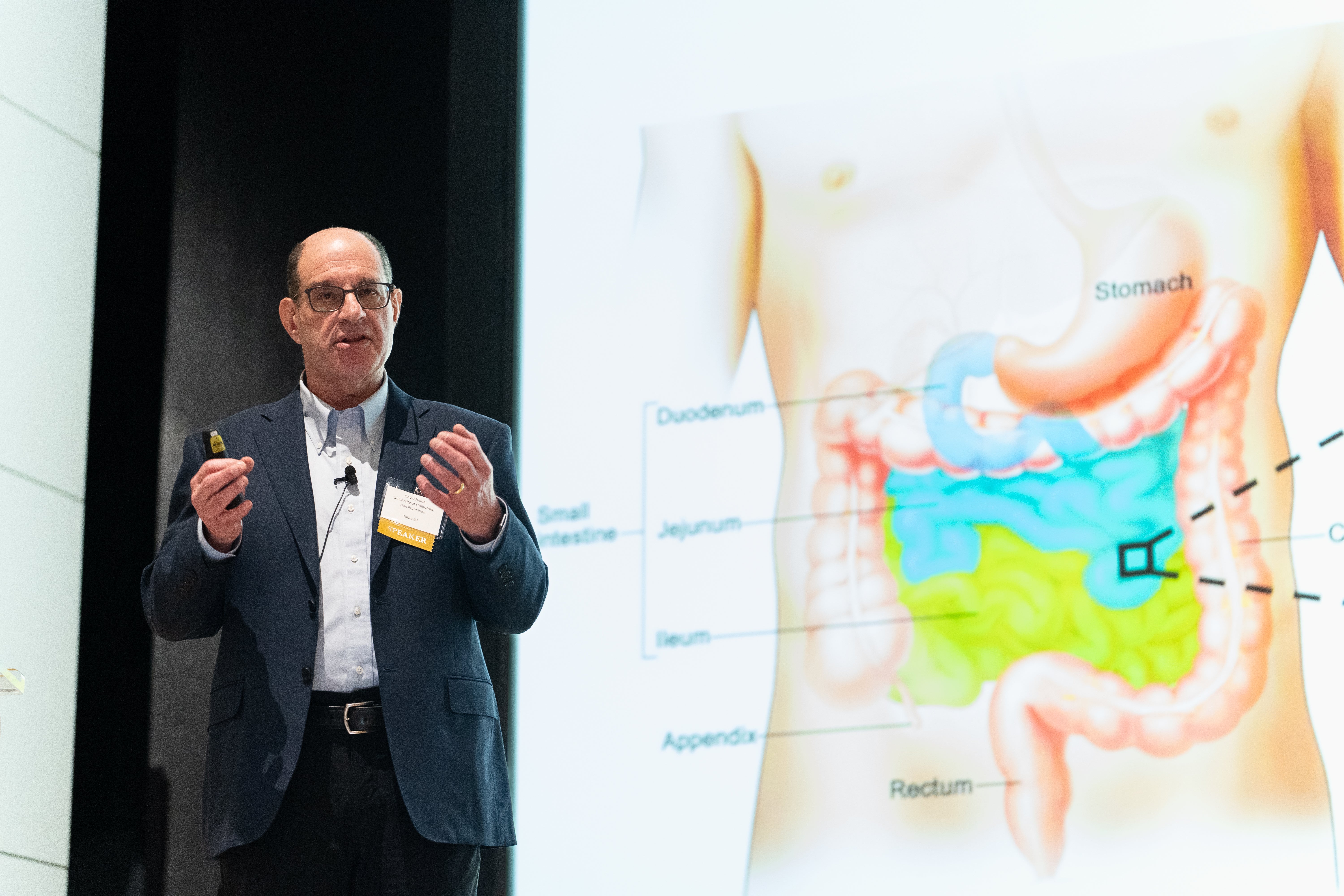 Caption: David Julius, as part of the Senior Vice Chancellor’s Laureate Lectures and Pain Day, delivers his keynote address called “Gut Feelings: Probing Mechanisms of Visceral Pain” in Alumni Hall on May 7, 2025.
Caption: David Julius, as part of the Senior Vice Chancellor’s Laureate Lectures and Pain Day, delivers his keynote address called “Gut Feelings: Probing Mechanisms of Visceral Pain” in Alumni Hall on May 7, 2025.
By Kat Procyk
Photography by Rayni Shiring/University of Pittsburgh
The Pittsburgh Pain Consortium (PPC), a collaborative network of Pittsburgh-based scientists, clinicians and patients dedicated to ending pain-related suffering, hosted its inaugural Pain Day, showcasing cutting-edge research aligned with its mission on May 7, 2025.
The event, held in the University of Pittsburgh’s Alumni Hall, featured faculty presentations from Pitt, Carnegie Mellon University and Duquesne University on the latest advances in pain research. David Julius, chair of the Department of Physiology at the University of California San Francisco School of Medicine, presented “Gut Feelings: Probing Mechanisms of Visceral Pain,” both as part of Pain Day’s keynote address and the Senior Vice Chancellor’s Laureate Lectures, the University’s series featuring some of the world’s top-tier scientists engaged in significant and dynamic biomedical research currently underway.
Rebecca Seal, professor of neurobiology, School of Medicine, Pain Day co-organizer and founding member of the PPC, met Julius while working in a lab at the University of California San Francisco as a postdoctoral researcher.
“David doesn’t just ask how pain works—he asks how we can unravel it at the molecular level to truly help people,” Seal said. “His curiosity, precision and mentorship continue to inspire an entire generation of researchers, including myself.”
Julius’s keynote explored what causes visceral pain, especially in the gut, which affects about 15% of people and is more common in women. He explained how special cells in the gut, called EC (enterochromaffin) cells, help detect harmful signals and release serotonin, a chemical that activates nearby nerves and can lead to pain. Some of these cells constantly release serotonin, while others respond to things like stress or damage. Julius also pointed out that women tend to have a stronger baseline response to pain that is tied to estrogen but the mechanisms underlying this require further investigation. His team also investigated signaling mechanisms along the crypt-villus axis of the gut related to the development of long-lasting visceral pain and is looking into possible treatments that target specific receptors they showed are involved, like TRPA1 and TRPM2.
Julius and Ardem Patapoutian, professor at Scripps Research and Howard Hughes Medical Institute investigator, won the 2021 Nobel Prize in Physiology or Medicine for their breakthrough discoveries of receptors for temperature and touch. Julius continues this work with his lab by exploring how sensory systems allow humans to perceive the world.
Julius’s research group has investigated the properties of natural products to uncover a family of thermo- and chemo-sensitive ion channels that enable sensory nerve fibers to detect temperature changes and noxious stimuli. Using genetic, electrophysiological and behavioral approaches, they have elucidated the role of these ion channels in pain sensation and how their activity is influenced by factors such as tumor growth, infection and injury-induced inflammation, leading to pain hypersensitivity.
Pain Day also hosted the award ceremony for Pitt’s Clinical and Translational Science Institute (CTSI) and ended the day with a poster session and reception. The winners of CTSI’s Virginia Kaufman Pain Research Challenge were Benedict Alter and Pulkit Grover, for “Real-Time Motor Cortex Stimulation for Knee Osteoarthritis Pain During Walking,” and Michael Gold for “Guided Migraine Management,” each winning a $75,000 award.
